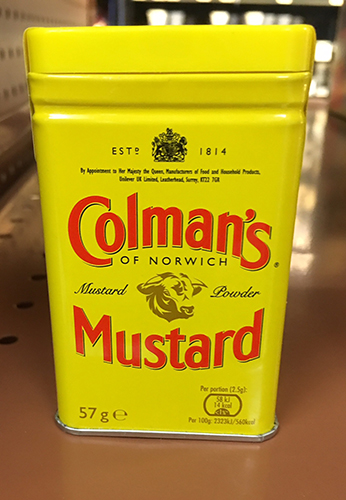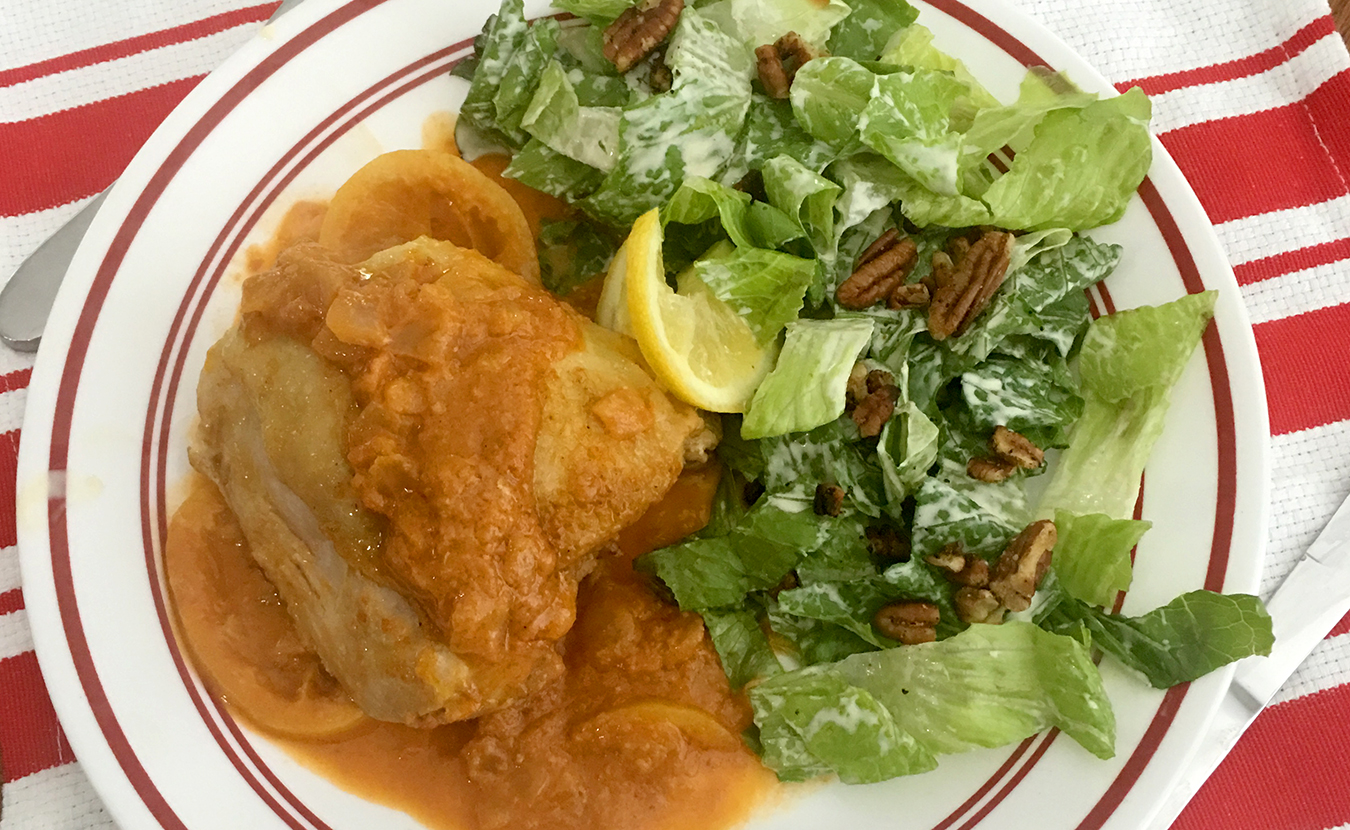In a kitchen cupboard of my childhood home, my mother kept a yellow tin of Colman’s Dry Mustard. I never actually saw her cook with it. But whenever you opened that cabinet, there it stood, neglected, unused, forlorn.

Now Colman’s Mustard is a part of Ruthie’s well-stocked kitchen. | Photo by Ruthie Cohen
Back then, mustard was a nasty condiment to my young palate. It was ketchup on my hot dogs, and only milk chocolate, none of that dark stuff, thank you very much. Olives? I don’t think so. And pickles? Uh-uh. Brie, Camembert, anchovies … forget ’em!
Turns out, getting older does have its culinary epiphanies and delights.
There is a reason that mustard has endured — it is even more ancient than the yellow tin on my mom’s shelf. The humble mustard seed has been the base for condiment, medicine, and even religion. The ancient Romans ground the seeds and mixed them with wine or vinegar to form a delicious paste, and a book by the master cook of King Richard II of England, circa 1390, included a mustard recipe. Hippocrates lauded a mustard poultice for its ability to soothe aches and pains. Tombs of Egyptian Pharaohs are filled with the holy seeds to spice up and ensure their afterlife, and, in Christianity, the Parable of the Mustard Seed is used to describe the idea that large growth comes from small/humble beginnings.
And let us not forget Monsieur Maurice Grey, a French mustard maker who received a royal appointment in 1860. When he needed financing to manufacture a mustard-making machine, he approached none other than Monsieur Auguste Poupon. Merci beaucoup, Dijon!
Today, both dry and bottled mustard are very much a part of my well-stocked kitchen. And so is dark chocolate, capers, anchovies, and the occasional tête de moine (or monk’s head, a particularly divine and stinky hard cheese). The hot dogs (but not the ketchup), alas, have been banished.
Deviled Eggs
6 eggs
2 tablespoons mayonnaise
1/2 teaspoon dry mustard (or 1 teaspoon Dijon mustard)
1/2 teaspoon paprika
Boil the eggs in a small pot. My method for hard boiled eggs is to place the eggs in the pot and cover them with water. Bring to a boil. Cover the pot. Remove from the heat and allow them to sit for 10 minutes. Drain the pot of the hot water and run the eggs under a faucet of cold water. Allow eggs to cool.
Peel the eggs and slice them lengthwise in half. The yolks will just pop out or you can gently scoop them out with a spoon. Set the whites aside and place the yolks on a plate. Mash the yolks and mix in the mayonnaise and mustard. No other seasoning is necessary.
Using a spoon or a pastry bag with a decorative tip, fill each hole of the egg whites with the yolk mixture. Sprinkle with paprika.
Optional toppings include crumbled bacon, finely chopped scallions, and red or black caviar.
Romaine and Walnut Salad
1 head romaine lettuce
1 1/2 tablespoons olive oil
3/4 cup walnuts or pecans, coarsely chopped
1 teaspoon garlic powder
1/2 teaspoon salt
3 tablespoons mayonnaise
1 tablespoon Dijon mustard
1 tablespoon water
Chop lettuce leaves or slice into narrow strips. Place in a serving bowl and refrigerate.
Heat oil in a medium skillet. Add walnuts or pecans, garlic powder, and salt. Sauté for several minutes until nuts begin to darken. Drain on paper towels. Allow to cool.
Mix mayonnaise and mustard in a small bowl until a smooth paste is formed. Thin the paste with water. Pour dressing onto lettuce. While reserving one tablespoon of nuts, gently mix remaining nuts into the salad. Garnish with reserved nuts.
Chicken in Mustard Sauce, Middle Eastern Style
Many years ago, I fell hard for this dish on a visit to a kibbutz in the Golan Heights. The cook proudly shared the recipe, which I have adapted here.
2 tablespoons olive oil
4-6 skinless bone-in chicken thighs
2 tablespoons butter
1 large onion, chopped
4 tablespoons tomato paste
2 lemons, sliced
1 tablespoon sugar
4 tablespoons Dijon or deli style mustard
1/2 cup water
Parsley, chopped
In a cast iron pan or a large skillet with high sides, heat olive oil on medium heat. Pat chicken parts dry with paper towels and place chicken in the pan. Brown chicken lightly, turning once, for about 10 minutes. Remove chicken from pan and place on paper towels to absorb the oil.
Pour excess oil from the skillet, add the butter and melt. Add onion, tomato paste, one of the lemons, and sugar. Sauté for several minutes until the onion softens. Add mustard and water. Stir well. Arrange chicken over the sauce. Cover pan. Reduce heat to low and cook for about 30 minutes until chicken juices run clear when pricked with a fork.
Serve garnished with the second lemon and chopped parsley.


